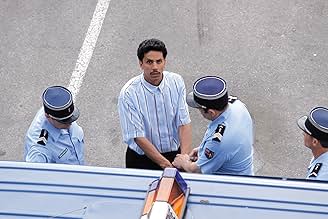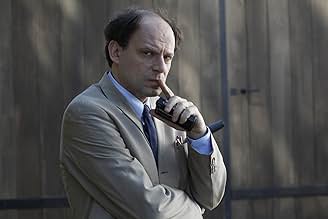Füge eine Handlung in deiner Sprache hinzuIn the summer of 1991 an elderly woman Ghislaine Marchal is found murdered in the basement of her home with the message "Omar M'a Tuer" (Omar has kill me) written beside in her own blood. De... Alles lesenIn the summer of 1991 an elderly woman Ghislaine Marchal is found murdered in the basement of her home with the message "Omar M'a Tuer" (Omar has kill me) written beside in her own blood. Despite a lack of forensic or DNA evidence, her Moroccan gardener Omar Raddad is found guilt... Alles lesenIn the summer of 1991 an elderly woman Ghislaine Marchal is found murdered in the basement of her home with the message "Omar M'a Tuer" (Omar has kill me) written beside in her own blood. Despite a lack of forensic or DNA evidence, her Moroccan gardener Omar Raddad is found guilty and sentenced to 18 years in a French prison. Shocked by the case, and convinced of his ... Alles lesen
- Auszeichnungen
- 2 Nominierungen insgesamt
- M. Sheriff
- (as Lounès Tazaïrt)
- Gendarme 2
- (as Piero Brichese)
Empfohlene Bewertungen
If you're not French or Moroccan, or at least North African, chances that you're familiar with the case are rather thin. Being a Moroccan, I remember in the early months of 1994 how each daily news covered it, the picture of the gardener Omar Raddad, his supposedly victim, the rich widow and socialite Ghislaine Marchal, were faces printed in my mind, but it's thanks to the infamous "Omar Killed Me" quote that the case went down in history. The victim, after receiving multiple knife wounds, used her ultimate forces to crawl her way to a cave and write with her own blood the implacable accusation, with a spelling error obviously lost in translation. The gardener was the suspect number one, and probably guilty before trial, and fearing an escape to his country, the Police immediately arrested him.
Ever since that sordid case begun to spread the news, the quote '"someone" killed me' has entered French language as a metaphor of a desperate cry, an accusation directly addressed by the victim, whether it's a fraud, an abuse, or a firing. This is how vivid the memories are, and it was obvious that any project, any movie made about the case would use such an evocative title. I was a preteen at that time, but I followed the case with a deep interested and I even read the Academician's book "The Making of a Guilty Man" of which the film relates the making. The devil's advocate didn't believe it was an open-and-shut case and pointed the lax way it was handled by the Police and the Court while many questions were left unanswered. Besides, the very fact that Omar could barely speak French, let alone understand the questions, didn't help his defense. So, it's not much the certitude of Omar's innocence than the compassion to a man whose side wasn't given much liberty to prove his innocence.
To list a few point of uncertainties: how could the poor, agonizing woman write on the door without holding it, how could the letters be so well written? How come the Police established the hour of death the day where Omar could provide an alibi and then pretend it was a typo? How about many witnesses who gave names of potential suspects? How about the fact that the victim was quickly incinerated preventing from any counter-expertise? The attitude of the main protagonist, played by Denis Polydades, reminds of Juror #8 in "12 Angry Men", there's no conviction that Omar is either victim or innocent, but there's more than a reasonable doubt. Of course, Roshdy Zem, the director, is convinced that Raddad is innocent and adopts his opinion as an angle to the film's narrative. Naturally, such a film had to take a clear side and Samy Bouajila plays an Omar Raddad with the right amount of pathos and vulnerability, but I wish it could confront the two sides of the story with the same zeal.
I understand Roshdy Zem wanted to do a character study more than a courtroom drama and there's no doubt over the dramatic potential of the story of a wrongfully accused foreigner, not to make it a Dreyfus affair as the passionate lawyer Jacques Vergès would claim, but something closer to Hitchcock's "Wrong Man", to name another Fonda movie. Objectively, it was a puzzling case that didn't reveal all its secrets because of a botched investigation and that was an accusation more viable than the plain statement of Omar's innocence. I personally believe he is innocent, but I feel like the partiality of Zem did a disservice to his initial intent, which was to invite the Justice to re-open the case, and tackle it with more seriousness and if possible, see how the use of DNA can clear Raddad from these accusations. The film should have been more impartial for the innocence thesis' own good.
The performances were remarkable, and Samy Bouajilla deserved his nomination for the French Oscars (although he didn't look like Raddad who was taller with more delicate features, in fact, Roshdy Zem would have fitted as well). I just wished the film had focused a little more on his charismatic lawyer, the famous or infamous Jacques Vergès, former lawyer of terrorist Carlos and Klaus Barbie, whose flamboyant and erudite personality had overshadowed his client's case, inflicting so much political resonance to his defense that he became like Zola stealing Drefus' thunder. But Vergès is relegated to a secondary, in fact, tertiary level while he was probably one of the main protagonists, so it's rather puzzling for a film of such mature directing to give such a small part to such an important character, but to be completely fair, it doesn't add much to the case either.
"Omar Killed Me" simply revisits the case with a more human focus on its protagonists, but there was so much to tell about it, so much to remind us about that a documentary might have been more insightful. One reading of Wikipedia has been richer in information and insights while the film was more about Omar's struggle. But it's precisely for the sake of his rehabilitation and in tribute to his difficult journey, that the film should have had a more rational approach to the case.
Is there justice for an Arab who can't read and write and don't know much French? Is he sentenced because of his origin, so the real killer instead can go free? We follow Omar and we follow the writer who tries to release him.
It's not your usual law drama, seen countless times on the screen. The drama is in fact not most important, but what's going on in people's mind. This is why you will remember this.
"Omar M'a Tuer" is a compelling portrait of an innocent man taken to justice when his alibis and ability of communication in a language he cannot master aren't enough to justify his being on the wrong place and the wrong time. This movie is quite an emotional ride, fast paced and very realistic, confirming the old saying that "justice is blind" could easily materialize around us when we least expect.
It is hard enough to prove a person's innocence by using veridical evidence when the main reason of such accusation cannot be verified against growing racism. It raises the question whether a citizen might receive the same treatment when clear prejudice from the Justice Department can be so compromising. Very good movie that not only tackles the never ending problem of legal injustice but also cultural misconception. Worth watching.
Based on true events, the case of Omar Raddad outraged the media at the time and questioned the very integrity of the French juridical system against foreigners. Raddad was tried in 1996, partially pardoned by then President Jacques Chirac in 1996 and finally released in 1998. In France, Omar is still considered guilty by the law, and this film, based on his autobiography, might be his last attempt to clear his name.
The film tells two stories; the investigation by writer Pierre-Emmanuel (Denis Podalydès), and Omar's time in prison. At the same time, we learn of Omar himself, a simple but stoic man, who didn't go to school, but believes in the honor of his name and that of his family.
As the film demonstrates, there were no traces of blood on his clothes, no indication of his presence at the crime scene. Evidence also points to the fact that he was somewhere else at the time of Marshall's death. But in a classic case of corruption, Omar is left to fight against a whole system. Results are manipulated, and Marshall's body is burnt to avoid further investigation. The frustration of his situation pushes Omar to go on food strike in prison – and desperation eventually that leads him to attempt suicide.
Sami Bouajila has an impressive approach to Omar – he doesn't talk much, but uses his eyes to express his predicament. Consequently, his sparse use of dialogue is all the more effective. "I have no more life, the judge destroyed it," he cries. The portrayal granted Bouajila the Best Performance Award at the 2011 Doha Tribeca Film festival, alongside a Best Arab Narrative Filmmaker award for director Roschdy Zem.
This is not a film with outstanding cinematic techniques, but presents a story rooted in reality and Omar's injustice. Zem solicits powerful performances from his cast, without mining the material for pity. The director is an actor himself and this, his second feature, presents the cause of Omar as unfinished business – justice has yet to be delivered.
Similarly, the investigation at the heart of "Omar Killed Me", even as it sets out to prove his innocence, allows the audience to look for clues, make connections and judge for themselves. We follow the investigation of a police drama which is based on fact and where the judges play devil's advocate. There is little conflict over Omar's innocence, but a dawning realization that those in power are readily able to gather their facts and manipulate them in order to convince those who already suspect Omar of the crime. In the end, the film shines a spotlight on a long forgotten case. One can't but respect a filmmaker who sets out to try and make a change.
Wusstest du schon
- WissenswertesThe scene where Omar Raddad's defense speaks to the press outside the courthouse saying, "A hundred years ago we (France) condemned a younger officer because he was Jewish." Is a direct reference to the Dreyfus Affair. Similar to Raddad, Alfred Dreyfus was wrongfully accused and convicted of treason for passing French military secret information to German Embassy and sentenced to life imprisonment in 1894. Despite evidence proving that Dreyfus had not commit treason and a French Army general Ferdinand Walsin Esterhazy was the real culprit, Dreyfus continued to endure various court hearings in the same manner as Raddad. In both cases the French justice system was viewed as discriminating against Dreyfus who was Jewish where as Raddad is equally let down by the same system for being Arab and Muslim. Dreyfus was eventually released from prison in 1906 after serving a 12 year sentence.
- VerbindungenReferenced in C'est qui café ça? (2017)
Top-Auswahl
Details
- Erscheinungsdatum
- Herkunftsländer
- Sprachen
- Auch bekannt als
- Omar Killed Me
- Drehorte
- Chemin de Garibondy, Le Cannet, Alpes-Maritimes, Frankreich(Raddad family apartment in Toulon)
- Produktionsfirmen
- Weitere beteiligte Unternehmen bei IMDbPro anzeigen
Box Office
- Weltweiter Bruttoertrag
- 4.439.826 $
- Laufzeit1 Stunde 25 Minuten
- Farbe
- Sound-Mix
- Seitenverhältnis
- 2.35 : 1
Zu dieser Seite beitragen

























